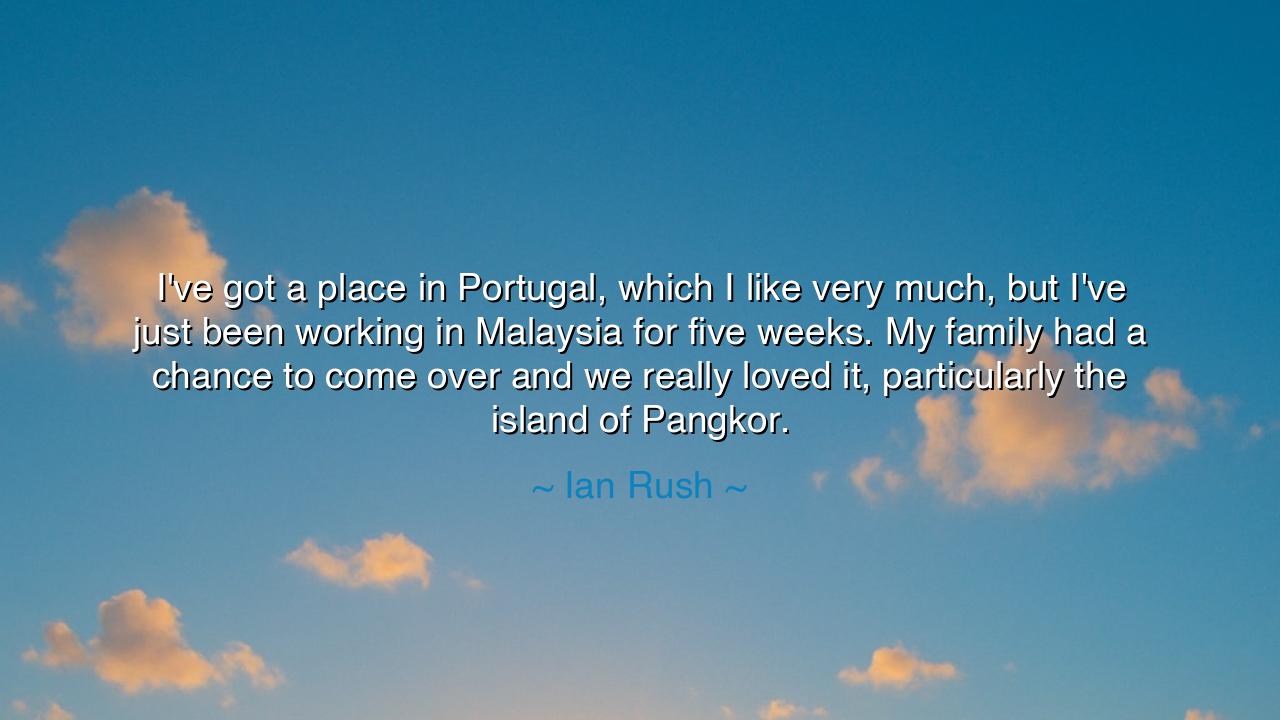
I've got a place in Portugal, which I like very much, but I've
I've got a place in Portugal, which I like very much, but I've just been working in Malaysia for five weeks. My family had a chance to come over and we really loved it, particularly the island of Pangkor.






In the words of Ian Rush, "I've got a place in Portugal, which I like very much, but I've just been working in Malaysia for five weeks. My family had a chance to come over and we really loved it, particularly the island of Pangkor," we hear the reflection of a man who has not only experienced the world but has also come to appreciate the profound connection that travel brings. Rush’s words, while simple, convey the deeper truths of exploration, family, and the transformative nature of experiencing new cultures. His love for Portugal, his work in Malaysia, and the joy he finds in Pangkor highlight the beauty of both familiarity and the excitement of discovery. In his journey, we see that life is not just about settling into one place, but about embracing the richness of experience that comes from traveling and connecting with the world.
Rush’s acknowledgment of his home in Portugal speaks to the timeless human desire for rootedness—the feeling of belonging to a place that offers comfort, stability, and a sense of peace. Just as ancient civilizations, from the Greeks to the Romans, found significance in their homeland, Rush’s connection to Portugal mirrors this deep, innate pull toward a place that offers solace. Portugal represents not just a home for him but a space where the rhythm of life is familiar, where he can find tranquility in the midst of a fast-paced world. This balance between home and adventure, between the known and the unknown, is something that resonates deeply with the human spirit, for we all seek the stability of home while yearning to explore the world beyond.
However, Rush’s words also speak to the value of travel—not just as a physical act, but as a way of opening one’s mind and heart to the broader human experience. His time in Malaysia, far from his home, was not just a fleeting work trip; it was an opportunity for growth, a chance to immerse himself in a new culture, to learn, and to experience the world from a different perspective. Just as Herodotus, the ancient historian, traveled to distant lands to learn about the world and its people, so too does Rush’s journey exemplify the ancient tradition of exploration—a way to enrich the mind, to expand one’s understanding, and to bring home insights that are gained only through experiencing the other.
The island of Pangkor serves as a metaphor for the rewards of discovery. It is a place that not only captured Rush’s admiration but also offered a space for connection with his family, a shared experience that strengthens their bond. In the same way, ancient pilgrims embarked on journeys to sacred lands, seeking to find deeper meaning and connection not only with the world around them but with the people who traveled alongside them. Pangkor, for Rush, becomes a symbol of the beauty of new experiences, the joy of discovery, and the profound connection that comes when we explore the world with those we love. In this sense, every journey we take can serve as an opportunity to grow, to bond, and to enrich our lives.
Rush’s reflection also points to a timeless truth: life is richer when we embrace both the familiar and the unfamiliar. Comfort is found in the places we return to, but growth is found in the places we choose to explore. Whether it’s Portugal, a beloved home, or Malaysia, a new venture, the act of moving between these worlds provides the opportunity to weave new experiences into the fabric of our lives. This interplay between home and adventure is what makes life meaningful. It is through contrast—between the places we love and the places we’ve yet to discover—that we are able to deepen our understanding of ourselves and the world.
The lesson we take from Rush’s words is that travel is not simply about physical movement, but about the transformative power of experience. In our own lives, we must seek to explore both the places that feel like home and the places that challenge us to grow. Just as Rush embraced both his life in Portugal and his time in Malaysia, we too should find a balance between the comfort of familiarity and the excitement of discovery. Whether it’s through physical travel or metaphorical exploration, each journey offers the chance to expand our horizons, to deepen our relationships, and to enrich our understanding of the world around us.
In the end, the journey of life is about embracing both the known and the unknown—finding meaning not only in the places we return to, but in the places we venture toward. Like Ian Rush, let us remember that true growth comes from the willingness to step beyond the familiar, to open ourselves to the world and to the experiences that await us. For it is through this balance of rootedness and exploration that we find the richness and depth of a life well-lived.






AAdministratorAdministrator
Welcome, honored guests. Please leave a comment, we will respond soon